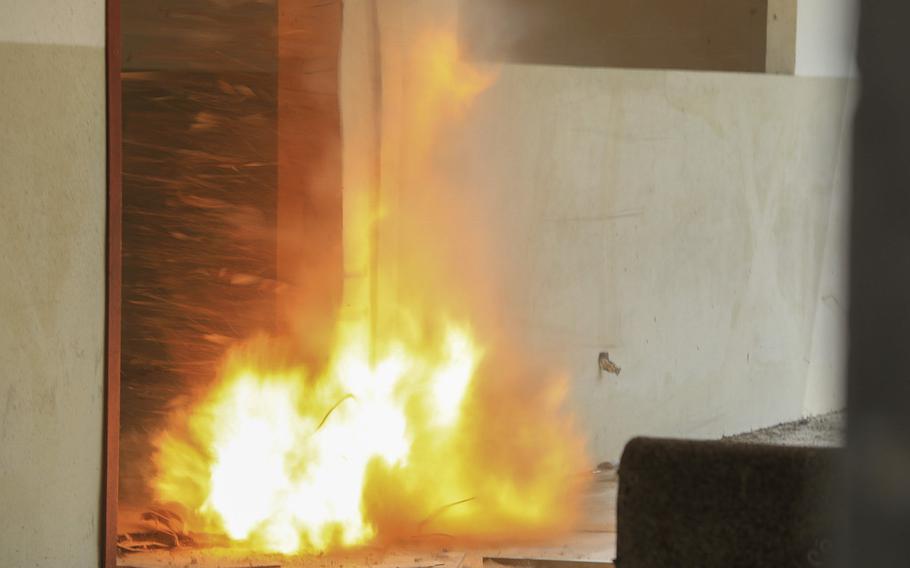
An explosion breaches a door during close quarter battle training involving joint combined forces training in Manta, Ecuador, May 16, 2022. According to reports on Aug. 16, Ecuador’s interior minister called a recent bombing that killed five and injured 17 a declaration of war against the state. (Matthew S. Griffith/U.S. Army)
It was the dead of night when homemade explosives detonated Sunday in a populous neighborhood in Guayaquil, one of Ecuador's largest cities and the country's commercial hub. The explosion left five people dead and 17 injured - the latest casualties in a gang-fueled wave of bloodshed.
Ecuador's interior minister, Patricio Carrillo, called the blast "a declaration of war against the state" by criminal gangs whose feuds to control drug turf have left a growing trail of collateral damage.
In Cristo del Consuelo - a neighborhood known for its street parties and clandestine dance clubs - residents were left reeling after the eruption at 3 a.m. Authorities said men arrived on motorcycles and threw a bag filled with explosives onto the street. The blast set off a shock wave that was felt up to 230 feet away, Carrillo said. The street was left covered in rubble, bodies and blood.
Among the victims was a woman who was standing by her balcony before the explosion hit. The owner of a canteen and a taxi driver were also killed at the scene, El Universo reported. Eight homes and two cars were destroyed in the blast, the country's National Risk and Emergency Management Service said on Twitter.
Longtime residents say there has been an escalation of organized-crime activity, the drug trade, homicides and robberies over the past decade.
"We would give anything not to live here anymore. We are living a nightmare," one of the victims' family members told local outlet GK.
The motive for the attack remains unclear. However, in a Sunday news conference, Carrillo said preliminary information points to its being a targeted assault on a man known as "Cucaracha" - or cockroach - who is believed to have ties with Los Tiguerones, one of Ecuador's most feared gangs. Officials are also investigating whether the explosion is connected to three other violent events that same weekend or to a drug bust from earlier this month, he added.
Yet the probe has been challenged by a seeming lack of cooperation from witnesses, Carrillo said. None of the injured residents wanted to talk to authorities, he said. Although there's a $10,000 reward for helpful information, tips have yet to come through.
In an attempt to contain the mushrooming violence, Ecuadoran President Guillermo Lasso declared a state of emergency in Guayaquil, which will enable the immediate mobilization of multiple law enforcement agencies, including those dealing with criminal investigations, organized-crime fighting, weapons and explosives, and transnational crimes. The order also empowers the agencies to disrupt meetings in public spaces and to carry out inspections and searches at citizens' homes.
On Monday, Ecuadoran police carried out 11 home searches in Guayaquil, where they arrested five people and seized explosives and weapons. Law enforcement officers also arrested two people after finding that they possessed homemade explosives similar to the ones used in the Cristo del Consuelo attack, the country's Interior Ministry said on Twitter. As of early Tuesday, no one had been formally accused of setting off the explosives on Sunday.
Of 145 explosive-related attacks in Ecuador this year, 72 have taken place in Guayaquil, which has become the epicenter of the rise in violence, according to government figures.
That's probably because of the city's strategic location. Home to the country's main port, Guayaquil is a major transportation point for drugs flowing in from neighboring Colombia and Peru, the world's top cocaine producers. The rivalry to control what nonprofit investigative outlet InSight Crime deemed "a cocaine superhighway to the U.S. and Europe" has unleashed devastating effects on Ecuador as gangs use brutal tactics to squash the competition.
The violence has played out mostly within the country's overcrowded and under-resourced prisons, where gang clashes have killed hundreds in recent years. Yet the bloodshed is increasingly spilling into the streets. On Feb. 14, two corpses were seen hanging from a bridge. A day later, a decapitated head was found inside a bag. Gangs are now deploying makeshift explosives and car bombs.
Although the recent incidents seem especially gruesome, officials say the violence has been brewing for over a decade.
"This is not a problem that arose yesterday, nor six months ago, nor a year ago," Ecuador's minister of government, Francisco Jiménez Sánchez, said Sunday. "These are conditions that have been dragging on for the last 15 years in particular."